#parwan
Text
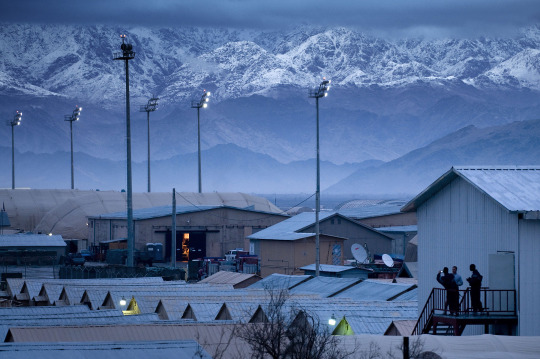

whenever i see that infamous brown filter over every image or video of afghanistan, i think about these photos
19 notes
·
View notes
Text

A mother dressed in a Burqa holds her child on Wednesday, 03 March 2004, in Parwan province, Afghanistan.
36 notes
·
View notes
Text
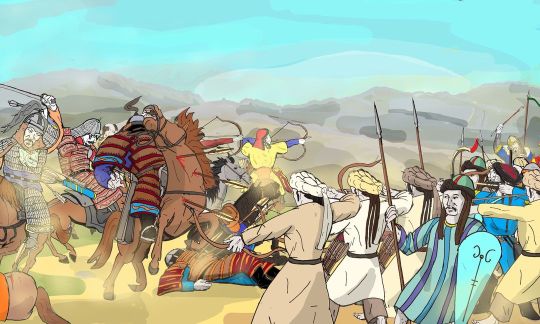
The Battle of Parwan, September 1221; This was Khwarezm-shah Jalal al-Din Mingburnu's victory over a Mongol army under Shigi Qutuqu, the adopted son/brother of Chinggis Khan. Jalal al-Din was a son of the late Khwarezm-shah Muhammad II, and had fled into what is now Afghanistan, rallying whoever he could for a resistance against the Mongols. After defeating a small vanguard force, Chinggis Khan ordered Shigi Qutuqu to bring Jalal al-Din to heel.
Jalal al-Din brought a substantially larger army than Shigi Qutuqu; according to Juvaini, one of our main sources for the battle, Jalal al-Din had 60-70,000 men compared to Shigi's 30,000. Jalal al-Din's army was of greatly varied background; Jalal al-Din commanded the centre, a mix of Khwarezmian and Ghuri troops; on his left wing, Amin Malik commanded a large Qipchaq contingent, and his right wind under Saif al-Din Ighraq was a host of Khalaj and Turkmen.
Despite the fact that much of the army usually fought from horseback, Jalal al-Din ordered them to fight dismounted. We might suspect this was the best way to reduce the chance of troops breaking rank to pursue the Mongols into feigned retreats, or to flee before them, while ensuring that his archer's had stable platforms with to pick their shots.
The battle took place over two days, with Jalal al-Din's men holding their ground; on the night of the first day, Shigi Qutuqu placed dummies on horseback in an effort to frighten the Khwarezmians into thinking Mongol reinforcements had arrived. The ploy nearly worked, but Jalal al-Din was made of sterner stuff and kept his commanders in line. Another fierce day of fighting followed, and Shigi Qutuqu sent an elite cavalry force to charge against the Khwarezmian left flank. Here, Jalal al-Din's archers, through volley after volley, broke the Mongol charge, and soon after Shigi Qutuqu took his army from the field.
I talk about Mongol heavy cavalry in the war against Khwarezm in my latest video:
youtube
5 notes
·
View notes
Text
MCU Timeline: Iron Man. Part 1 (First 36 hours)
I'm starting a new series of posts. Here I will try to create a logical timeline of the Infinity Saga. No promise to do it for every movie though, as I'm focused on Tony.
I find this attempt necessary because of the many conflicting timelines, official and unofficial, that exist on the Internet and in books. Most of them forgot to include logic when determining dates and periods. Including "official" ones. Remember, if the guys at Marvel can't create something that works, that's their problem, and fans shouldn't just buy what they say. Shitty job is shitty job.
Let's start from the beginning - 36 hours before the attack on the convoy in Afghanistan. Or should I say "about 34 hours" because, taking all the factors into account, I couldn't squeeze 36 hours in there. But it's fine, because the number 36 was most likely approximate and meant "a day and a half". The events cover 3 days in the second half of January or the first half of February 2008 (here's why). All times are approximate, except for 7:00 and 11:00, which is clearly stated in the film.
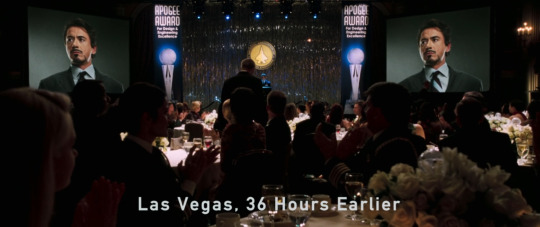
Day 1 - Las Vegas:
5 pm (34 hours before the attack) - Apogee Award ceremony, Tony gambles at the casino.
8 pm (31 hours before the attack) - Christine Everhart catches Tony leaving the casino. They go to his house in Malibu together.
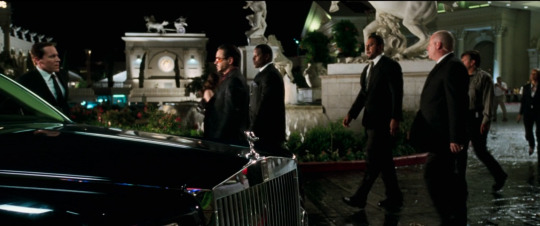
Why 5-8 pm: in the scene with Christine and Tony, we see that it is already dark outside. In February, sunset in Las Vegas occurs at 5:30 p.m., and it takes some time for the sky to turn black. Considering we had to get it done in about 36 hours, I gave Tony 3 hours in Las Vegas. I doubt he spent more time there: the ceremony wouldn't last long, and Tony didn't play in the casino for long after Rhodey came for him.
Day 2 - Malibu, Pepper's birthday:
1 am (26 hours before the attack) - Tony is back in Malibu. Sex with Christine.

Why 1 am: trip from Las Vegas to Malibu by car takes 4.5 hours.
6 am (21 hours before the attack) - scheduled departure from LA to Afghanistan. Tony is late.
7:00 am (20 hours before the attack) - Jarvis wakes up Christine. Tony is not in bed. Looks like he didn't sleep there at all.

7:00-7:30 am - Tony is working in the lab. Christine looks around the mansion. Pepper spends some time with her (about 30 min).
7:30 am (19.5 hours before the attack) - Pepper comes down to the lab and reminds Tony that he is 1.5 hours late for his scheduled flight.
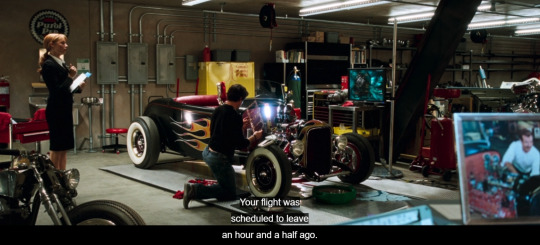
9 am (18 hours before the attack) - 3 hours late, the private jet finally takes off for Afghanistan with Tony and Rhodey on board.
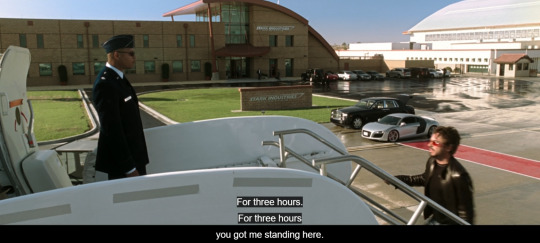
11 am (16 hours before the attack) - boys eat, talk and have fun on board, then Tony is taken to the bedroom on the plane (for sex and sleep). Rhodes is awake and drinking.
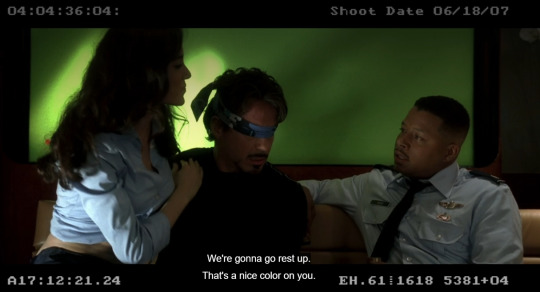
Day 3 - Afghanistan:
9 pm (LA)/9:30 am (Afghanistan) (6 hours before the attack) - Tony and Rhodey arrive at Bagram Air Base, Parwan Province, Afghanistan. They spend some time there watching The Air Force Drill Team while waiting for weapons to be loaded for presentation.
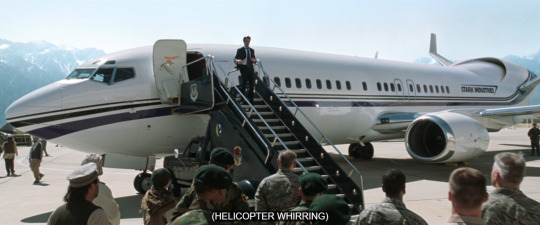
Why 9:30 am: a flight from Los Angeles to Afghanistan by private jet can take an average of 13 to 16 hours. Given that Tony was late, the pilot likely sped up and cut the time down to 12 hours to make it on time.
2 am (LA)/2:30 pm (Afghanistan) (1 hour before the attack) - the convoy reaches the proving ground in Kunar province. Presentation of Jericho. Stane can't sleep, waiting for a message from The Ten Rings.
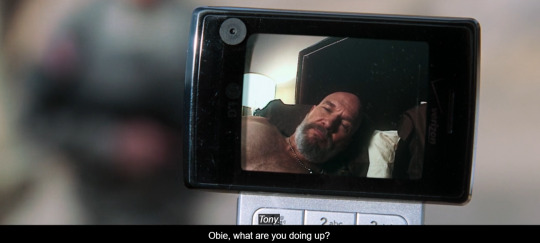
Why 2:30 pm: the trip from Bagram to Kunar province takes at least 4-5 hours. With heavy cargo it should be even longer.
3 am (LA)/3:30 pm (Afghanistan) - the attack.
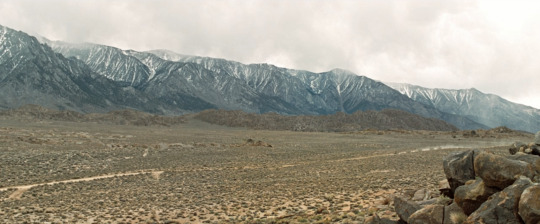
Mistakes made by Marvel:
Light clothing in Afghanistan in January/February. The daily mean there is 36-40°F during these months.
There is no such thing as 72° at 7am in Malibu in the winter. Perhaps that was the actual temperature on set instead. That it was colder outside is also indicated by Tony wearing a long-sleeve and a jacket on the way to the airport.
40 notes
·
View notes
Text
hey I'm collecting instances of obi-wan being nerdy, could you please help out?
so far i've got:
- knowing the price of the queen's wardrobe in tpm
- helping with the ship's repairs
- the deleted scenes in aotc where he has the saberdart analyzed?? i don't remember them too well so whatever
- explaining that kamino has to be there because of the gravity patterns
in tcw:
- knowing the legends about the geonosian queen
- making guesses about which orifice the brain worm will enter
- wanting to further study the brain worm
- speaking ryl (twi'lek language)
- in the box, knowing the thing about parwan blood types that gets them through the ray shield
- still in the box, instantly recognizing dioxis
- understanding a fair amount of other languages?? (i think he understands huttese at least but i'm not 100% sure, and he might understand binary too? he def understands aliens speaking weird languages on a couple of occasions)
- identifying nysillin/sillum (the plant hondo wants to steal from those farmers in the kurosawa tribute episode)
- knowing a type of sign language (the one eeth koth uses to signal his location when he gets captured)
- i'm sure there's stuff in the blue shadow virus episodes but i can't remember what precisely
- invoking zygerrian traditions to stall while ahsoka and anakin are looking for the togruta colonists (that time he gets his butt kicked for 5 minutes straight)
- knowing a whole bunch about treaties and history (the treaties with mandalore that make it impossible for the republic to help out for ex)
in the OT:
- knowing how to deactivate the tractor beam
if you can think of any other nerdy instances please please please tell me
240 notes
·
View notes
Text
They buried Qahar Asi with his poems

They buried Asi with his poems
By Rahmatullah Begana
Translated from the Farsi by Farhad Azad
Kabul's weather offered a mild respite on a somber autumn day, the city holding an unusual calm. No fighting erupted, and not a single rocket pierced the sky, a stark contrast to the usual barrage. It was September 28, 1994.
People tentatively emerged from their homes, children resuming their playful pursuits. We longed for a break, a departure from the usual war-ridden bedlam. The people huddled in their corners. As the sun dipped low, Qahar Asi approached us.
Due to the intense conflict in Kabul's Microrayon sectors, Asi, freshly returning from Iran, had left his home and now lived with his in-laws in Karte Parwan. We also lived in Karte Parwan. On September 28, Asi appeared on our doorstep, inviting us for a stroll.
We invited Asi inside, but he declined. With some reluctance, my brother Azizullah Ima and I finally ventured out with Asi.
The people of Kabul had quarantined themselves due to the rocket strikes and fighting. Aside from a few desperate souls, no one dared venture beyond their doorways.
Asi's insistence on an outing filled me with dread. Intuition warned of impending unease that day, yet I remained blind to the unfolding events. Asi led us away. Before long, he began reciting poetic verses from his earlier days.
We immersed ourselves in the warmth of prose and poetry alongside Qahar Asi. He recited his verses, each carrying a wealth of tales and portrayals. It was as if he sensed that these were the concluding hours of his life, eager to share his newly composed verses with his audience and friends.
Asi turned the pages where he had penned his poems, his enthusiasm radiating as he retrieved one poem after another from his shirt pocket, reading them gracefully and eloquently.
"Kabul, O Kabul,
the gushing blood from your throat,
how does the earth hold it without pain?
Who will lift your shredded coffin towards the sun?"
Asi carefreely recited his verses as the distant echoes of rockets reached our ears. For the first time, genuine fear gripped me. Though we had grown accustomed to the explosions, the rockets seemed to be heading straight for us.
We walked a considerable distance, returning from the Bagh Bala area as the explosions grew louder. Undeterred by the danger, Asi continued to recite in his woeful yet magnetic voice.
"These words aren't for the harsh autumn wind
these words aren't for the boulders
these words aren't for the eroded, lofty slopes.
the mountain has its sorrow,
the river has its sorrow,
the grove has its sorrow,
sorrows that destroy them"
Asi continued his passionate storytelling, and the explosions were ongoing. I suggested we veer from the main road close to the Kart-e Parwan intersection, away from danger, towards the narrow lanes nestled against the high hill.
In those days, the narrow lanes were lined with single-story mud homes, and only a few people moved about.
Kabul's ongoing war had ravaged the electricity and water systems. We had access to running water one day out of the week and electricity on just a handful of days.
Our journey continued alongside Asi's recitations. At a communal fountain, men gathered water, kids played marbles in the middle of the alleyway, and some children sought refuge, playing with dolls by the wall.
Asi recited verses with fervor. Due to my worry, I couldn't fully comprehend my friend's words. My brother and I trailed by his side.
The autumn wind carried Asi's voice, rising and falling with his recitation. I was nearing our home and eager to arrive quickly, yet time stood still. Our legs felt heavy, defying our attempts to move faster.
Seconds stretched, heavy with danger, as time ticked towards a catastrophic event. Three friends walked unknowingly towards it.
Yet we pressed on, but time remained stagnant. And then, from behind, the calamity that followed trapped us in the alleyway, forever altering our lives. No longer were we whole individuals. We were labeled the wounded and martyred.
Everything fused, and Asi fell silent. We, along with the little boys and girls of the alley, crashed to the ground, enveloped in dust and blood. Asi's recitation seemed to mingle with the cries of the wounded children as their voices choked the alley.
After a few seconds, as the dust and debris rose from the ground, I realized the absolute silence that had settled over Asi and Ima. Only my voice remained—a voice of sorrow, pain, separation, lament, despair, and hopelessness.
I couldn't understand what had happened, what catastrophe had befallen us, why we lay on the ground, covered in dust and blood. I was utterly bewildered and stunned!
The situation in this alley stood deeply sorrowful and heartbreaking. Yet, no one realized that a talented poet of verses had fallen, covered with soot and blood.
Liberty itself had fallen, lifeless and without support. No one reached out to help, for it no longer needed a hand. The dead and wounded littered the alleyway, and Asi— the voice of unwavering freedom— had also been silenced, deprived of life. Young men from the alley rushed to help, taking us to the hospital. The relatives cried and wailed loudly.
Asi and Ima lay still beside the blue-tinted gutter— people supposed they were martyrs. I begged the young men to help my brothers! They explained another vehicle would transport them and urged me to hurry due to my severe bleeding. Ima and Asi rested a short distance from me, motionless and silent.
The young men in the alley lifted me and took me to Abu Zaid, the nearest and the only private clinic in Kabul, in the Kart-e-Parwan neighborhood. When Ima and Asi arrived at the general hospital, the clinic staff mistook them for dead and placed them in the morgue.
I was in better condition than they were. A large piece of debris had struck my right leg, breaking the shin bone. A doctor at the clinic wrapped my leg with a bandage to slow the bleeding.
He said, "We can't do anything more here. You must transfer yourself to a government hospital."
The sky darkened, yet the sound of piercing rockets continued. An ambulance transported me to the government hospital. Memories of my mother's illness and death filled me in this familiar hospital, where I first saw Ahmad Zahir, the famous singer—days of hoping for my mother's recovery had been spent in its rooms and corridors.
But this time, a different tragedy had brought me here. Even as my condition remained poor as I entered the large hall and corridor, countless stretchers overflowed, leaving no standing room and crowding the space with the wounded and dead.
The young doctor looked familiar. He addressed the people who had brought me, "There is no space for beds here. Take your patient to the Wazir Akbar Khan hospital."
I recognized him and asked, "Are Asi and my brother among the wounded?"
He recognized me, too, and gently removed the white cover from my brother's bare body. "Don't worry, he is receiving treatment now," he reassured me.
Seeing my brother's face, I relaxed momentarily but remained deeply worried. My eyes searched for Asi. Once again, I joined the wounded on an ambulance ride to the Wazir Akbar Khan hospital.
On the way, a girl with eyes closed died silently as other children moaned in pain. One of these teenagers repeated: "O God, what sin have we committed that we are torn into pieces like this?"
The streets were empty. We quickly reached the hospital. As they removed me from the vehicle and placed me on a stretcher, many worries filled my mind. What had happened? Would Asi and Ima receive treatment?
The pain in my leg intensified. They carefully lifted my broken leg with both hands and took me to the hospital's surgical operations department. At 9:00 pm, I entered the operating room without my family present or a blood supply.
Before I passed out, a doctor who was busy operating on a patient asked his colleague, "What was the news at 8 o'clock?"
The second doctor replied, "Is there anything else in this country besides stories of pain and sorrow? Did you hear that the young poet—I'm talking about Qahar Asi— was martyred in today's rocket attack!"
"With God, we belong, and to him, we shall return," I thought to myself. Hearing this news, despair and hopelessness washed over me so vigorously that I could only remain silent and suppress my grief.
Asi's stories, laughter, passion, vitality, life, and poetry flashed through my mind. I said goodbye to everyone in my imagination. I didn't think I could survive this struggle alongside him. Seconds later, I passed out.
After the surgery, which took about two hours, according to Dr. Mozef, I struggled to regain consciousness due to extreme anemia. Death lingered close by. I felt as though I was hanging upside down from my feet.
My fight between life and death raged for more than seven hours. Finally, my condition began to improve slightly. I opened my eyes in the morning to a dark room with only the faintest dawn light filtering through the curtains. I couldn't remember anything.
Confused, I tried to understand why I was in this situation to no avail. I felt no pain, only the effects of severe anemia and the intense side effects of anesthesia, which slurred my words.
I felt people hovering over me, but my eyes wouldn't focus properly. I couldn't understand where I was! The silence puzzled me. Then, I recognized the dimmed hospital lights and the faint glow from outside.
I surveyed my surroundings; everything seemed strange, black and white. Seeing the IV stand confirmed my location. But none of my companions from the ambulance or the neighborhood kids, Ima and Asi, shared this space.
I remained in the hospital for days. Once I recovered somewhat, I went to visit Asi's mother. Upon my arrival, her distress intensified. She is a wise and kind woman who sees me as a reminder of her lost child, her young son who died too soon – a reminder of her son's untimely passing and the enduring pain she bears. Even though 26 years have passed since Asi's martyrdom, she still mourns and weeps as she did in the early days of Asi's death.
Asi's mother lost her composure at seeing me and began to cry. Everyone relived the great sorrow of the poet's death for a few moments.
I said, "Mother, I wish I had died instead of Asi."
She replied, "My child, you are the reminder of my son, and I sense Asi in you. May God grant you longevity and virtue."
I asked, "What happened to the poems from the day of Asi's incident?"
Mubin, Asi's brother, who was sitting with his mother, answered, "We buried Asi with his clothes and poems."
May the memory of my dear and beloved friend and companion, Abdul Qahar Asi, be cherished!
- - -
On September 26, 2020, the digest "8 AM" published Rahmatullah Begana's lamentable words, marking 26 years since Qahar Asi's voice fell silent. Begana's memory paints a dour portrait of Kabul in the autumn of 1994, a city choked by smoke and despair, where the relentless rhythm of rockets tore through the fragile silence. It was amidst this symphony of destruction that lives shattered, and so too, a poet's pen.
Begana's words weave an intimate tapestry of his friend and poet, Qahar Asi. He paints Asi's final moments with heartbreaking clarity, showing how even as the world crumbled around him, Asi clung to the lifeline of his poetry, his lyrics a defiant chorus against the descending darkness.
Though Asi was cruelly taken, his legacy blazes a defiant trail against oblivion. His poems are not merely words but searing echoes of a people's wounds, dreams, and resilience—beacons that will continue to light the path for generations to come.
—Farhad Azad
April 13, 2024
2 notes
·
View notes
Text

An Army of the Czech Republic soldier during a patrol near the Drya Ye Panjshayr River, Parwan province, Afghanistan.
The U.S. Army photo by Cpl. George Huley (2014).
19 notes
·
View notes
Text
shama kahe parwane se, pare chala ja meri tarah jal jayega, yahan nahi aa
vo nahiiii suntaaaaaa useyy jal jaaaanaaaaa hotaa haiiiii harr khushi se harr gham se begana hota hai
1 note
·
View note
Video
youtube
ਜਬੈ ਬਾਣ ਲਾਗਯੋ - ਆਜ਼ਾਦੀ ਦੇ ਪਰਵਾਨੇ Jabey Baan Lageo - Azadi De Parwane
0 notes
Text
Paunda Boliyaan Lyrics
Singer:Ammy Virk, Tarannum MalikAlbum:Puaada
Ni dil mera paunda boliyaanTere nacchan kanna diyan dandiyanNi dil mera paunda boliyaanTere nacchan kanna diyan dandiyanTu ankhan naal gadd dittiyan
Saadi jodi parwan ho gayiAa jivein sakhi naal paranda kudiyeKoka char panje ranga wala niMain sava lakh da le aanda kudiye
Ni ek teri wang vaaste, ek teri wang vaasteMain taan saariya barol dittiya…
0 notes
Text

The horsemen of the Panshir Valley play a game of Buzkashi against the Parwan Province Friday, 02 April 2004, in Kabul.
These are the last games in the competition this season as temperatures go up and wounds or scratches infect easily in the heat of Afghanistan. The horses are among the strongest, quickest, and trained to assist the rider a maximum when reaching for the goat or strategically defending it against the other players. The horsemen have to pick up the goat, ride around the field and drop it in a circle on the ground. If done so, they are awarded about a Euro by the wealthy spectators.
21 notes
·
View notes
Text

JALAL AL-DIN IN BATTLE WITH THE MONGOLS AT PARWAN, 1221
After Mongol prince Shigi Qutuqu began to withdraw during the battle of Parwan, Khwarezm-shah Jalal al-Din Mingburnu ordered his men to mount up and pursue. But Shigi Qutuqu pulled them into a feigned retreat, for he quickly had his Mongol army turned about and counterattack Jalal al-Din's advancing troops. This stopped the momentum of Jalal al-Din's army, and according to one of our main sources for the battle, this nearly caused Jalal's army to rout as 500 Khwarezmian troops were slain in quick order. Fortunately for them, Jalal al-Din's personal courage once again turned the tide: in Juvaini's account, Jalal al-Din personally led a new charge which rallied his troops, and caused them to chase the Mongols from the field.
Unfortunately for Jalal al-Din, in victory he found defeat for his resistance. His generals began to fight over the loot from Shigi Qutuqu's army, and despite Jalal al-Din's efforts to rein them in, the effort was fruitless. In short order, Ighraq, commander of the Khalaj and Turkmen in Jalal al-Din's army, abandoned the Khwarezmian cause. At the same time, Chinggis Khan himself was calling back all his forces to bring his full weight against Jalal al-Din's now halved-force. Jalal sought to wtihdrawal through India, but his army was caught and destroyed at the Indus River in November 1221. Though Jalal al-Din escaped (famously riding his horse off a cliff into the Indus River!) and lived to continue to be a nuisance to the Mongols, the defeat at the Indus marked the high point of his resistance to the Mongols.
I talk about Mongol heavy cavalry in the war against Khwarezm in my latest video:
youtube
2 notes
·
View notes
Text
Feast Your Eyes: Fandom Cookbook Recipe Review #6
Topato, Top-ah-to - Galaxy’s Edge: The Official Black Spire Outpost Cookbook
Tonight's menu: sourced from Star Wars Galaxy’s Edge: The Official Black Spire Outpost Cookbook
Main Dish: Topato Soup, pg 73
Side Dish: Parwan Nutricakes, pg 109
Dessert: Kat’s Kettle Corn, pg 43

Full review under the cut!
Aurum Leuci’s Log:
[Begin recording. The sounds of a lively tavern— live music, people talking and shouting, various kitchen noises— are audible in the background.] Hello! We made it safe. Just sat down for a couple of drinks while my pals are refueling their ship. They’re headed off someplace else, and I’m thinking I might stay on Batuu for awhile. It’s a little bit run down, like every secluded desert space outpost, but the people here really know how to cook. I promise this isn’t just a space vacation. See, I’ll even send over some photos of what we had to eat! It’s research! … and maybe a little bit of a space vacation. But I’m still sending you my reports! Chef Leuci out. [End log.]
Please see this post for my full review scale!
Main Dish: Topato Soup
RATING:
Difficulty: 5/5
Ingredients: 5/5
Immersion: 5/5
Time: 5/5
End Result: 4.5/5
TOTAL RATING: 24.5/25
This was delicious, and a really interesting take on a creamy soup. (And I got to use my immersion blender, hee hee.) I found the use of green salsa interesting, and while I used mild salsa (my mom can’t take any spice, unfortunately) I would have loved for it to be a little spicier, since I think that’s part of the recipe’s intent. Regardless, it was super easy, the ingredients were able to be found in any grocery store, and the inclusion of the alien chef’s backstory for where he got the recipe (it was part of what made him want to become a chef) really sold it for being a humble yet flavorful soup. It only loses 0.5 of a point because it didn’t turn out looking as creamy as the picture. Definitely going to make it again, sometime in the winter.
Side Dish: Parwan Nutricakes
RATING:
Difficulty: 4/5
Ingredients: 5/5
Immersion: 5/5
Time: 5/5
End Result: 4/5
TOTAL RATING: 23/25
I was really excited for these. Admittedly, they turned out to disappoint me a little bit, but I think they were still pretty good overall. They seemed in their photo to be like… mini falafel cakes? Which I was very excited about. Unfortunately, mine didn’t seem to really want to puff up, which I can really only blame on my egg substitute, or the recipe. Regardless, they were delicious, and the recipe actually made more than it said it would. I thought they’d be much bigger, but their tiny size made them perfect for pairing with the Topato soup and they were great for dipping.
Side Dish: Kat’s Kettle Corn
RATING:
Difficulty: 4.8/5
Ingredients: 5/5
Immersion: 5/5
Time: 5/5
End Result: 5/5
TOTAL RATING: 24.8/25
You know, I thought this recipe seemed kind of silly to include in a Star Wars cookbook, especially a theme park cookbook. I mean, it’s just kettle corn. Right? WRONG! I’m not sure how it’s presented in the actual park, since I haven’t been to Galaxy’s Edge, but the justification for having a kettle corn stand in this weird little outpost on a desert planet is that they grow the grain themselves and keep their spice blends secret. Which is a very fun justification, I think! The kettle corn called for garam masala, which really popped flavor-wise (and it smelled amazing). It only gets points off for being hard to clean up— if you’re not careful, the sugar on the bottom of the pot will burn and stick to the pot. Otherwise, it’s delicious. Now we have a metric ton of popcorn kernels, so I’ll definitely make some more soon.
Tune in next Wednesday (6/26/24) for another fandom cookbook review!
#voidlightcomix#cooking#feast your eyes#feast your eyes: recipe reviews#healthy food#foodpics#fandom food#food photography#star wars galaxy's edge#disney#star wars batuu#batuu#star wars cookbook#star wars fandom#disney fandom#galaxy’s edge#recipe reviews#artists on tumblr#culinary fantasy#black spire outpost#batuu black spire outpost
1 note
·
View note
Text
In Afghanistan, a "Tajik", is typically defined as any primarily Dari-speaking Sunni Muslim who refer to themselves by the region, province, city, town, or village that they are from;[41] such as Badakhshi, Baghlani, Mazari, Panjsheri, Kabuli, Herati, Kohistani, etc.[41][42][43] Although in the past, some non-Pashto speaking tribes were identified as Tajik, for example, the Furmuli.[44][45] By this definition, according to the World Factbook, Tajiks make up about 25–27% of Afghanistan's population,[46][47] but according to other sources, they form 37–39% of the population.[48] Other sources however, for example the Encyclopædia Britannica, state that they constitute about 12–20% of the population,[49][50] which is mostly excluding Persianized ethnic groups like some Pashtuns, Uzbeks, Qizilbash, Aimaqs etc. who, especially in large urban areas like Kabul or Herat, assimiliated into the respective local culture.[51][52][53] Tajiks (or Farsiwans respectively) are predominant in four of the largest cities in Afghanistan (Kabul, Mazar-e Sharif, Herat, and Ghazni) and make up the qualified majority in the northern and western provinces of Badakhshan and Panjshir while making up significant portions of the population in Balkh, Takhar, Kabul, Parwan, Kapisa, Baghlan, Badghis and Herat.
0 notes
Text
Events 4.29 (after 1950)
1952 – Pan Am Flight 202 crashes into the Amazon basin near Carolina, Maranhão, Brazil, killing 50 people.
1953 – The first U.S. experimental 3D television broadcast shows an episode of Space Patrol on Los Angeles ABC affiliate KECA-TV.
1967 – After refusing induction into the United States Army the previous day, Muhammad Ali is stripped of his boxing title.
1970 – Vietnam War: United States and South Vietnamese forces invade Cambodia to hunt Viet Cong.
1974 – Watergate scandal: United States President Richard Nixon announces the release of edited transcripts of White House tape recordings relating to the scandal.
1975 – Vietnam War: Operation Frequent Wind: The U.S. begins to evacuate U.S. citizens from Saigon before an expected North Vietnamese takeover. U.S. involvement in the war comes to an end.
1975 – Vietnam War: The North Vietnamese army completes its capture of all parts of South Vietnam-held Trường Sa Islands.
1986 – A fire at the Central library of the Los Angeles Public Library damages or destroys 400,000 books and other items.
1986 – The United States Navy aircraft carrier USS Enterprise becomes the first nuclear-powered aircraft carrier to transit the Suez Canal, navigating from the Red Sea to the Mediterranean Sea to relieve the USS Coral Sea.
1991 – A cyclone strikes the Chittagong district of southeastern Bangladesh with winds of around 155 miles per hour (249 km/h), killing at least 138,000 people and leaving as many as ten million homeless.
1991 – The 7.0 Mw Racha earthquake affects Georgia with a maximum MSK intensity of IX (Destructive), killing 270 people.
1992 – Riots in Los Angeles begin, following the acquittal of police officers charged with excessive force in the beating of Rodney King. Over the next three days 63 people are killed and hundreds of buildings are destroyed.
1997 – The Chemical Weapons Convention of 1993 enters into force, outlawing the production, stockpiling and use of chemical weapons by its signatories.
2004 – The final Oldsmobile is built in Lansing, Michigan, ending 107 years of vehicle production.
2011 – The Wedding of Prince William and Catherine Middleton takes place at Westminster Abbey in London.
2013 – A powerful explosion occurs in an office building in Prague, believed to have been caused by natural gas, and injures 43 people.
2013 – National Airlines Flight 102, a Boeing 747-400 freighter aircraft, crashes during takeoff from Bagram Airfield in Parwan Province, Afghanistan, killing seven people.
2015 – A baseball game between the Baltimore Orioles and the Chicago White Sox sets the all-time low attendance mark for Major League Baseball. Zero fans were in attendance for the game, as the stadium was officially closed to the public due to the 2015 Baltimore protests.
0 notes
Text
The Tulip's Blush Amongst the Azul Sky: Layla Sarahat Rushani on Renewal

The Tulip's Blush Amongst the Azul Sky: Layla Sarahat Rushani on Renewal
By Farhad Azad
In Layla Sarahat Rushani's quatrain, published in her 1998 collection "From Stones and Mirrors" (از سنگ ها و آینه ها), the poet employs vivid imagery to evoke a sense of renewal and awakening.
The literary translation "light from the blue eye" (از چشم کبود) illuminates the dawn light emerging from the darkness of night, bringing clarity and new beginnings to the blue sky. "Fire in the heart of the mirror" (آتش به دل آیینه) – the reflection of the rays in a mirror – could represent self-reflection and the ignition of inner force or creativity.
"Redness splashed across the horizon" (ز آن سرخی پاشید) conceivably refers to the deep colors of the sunrise, representing beauty and the possibility for change. Finally, the "fragrance of the tulip fields" (عطر تن لاله زار), perhaps the most evocative image in the poem, connects the red hue of the sky with that of the blossoming tulips of spring. The tulip, originating from Central Asia—Parwan province, the poet's place of birth—grew bountiful after the first spring downpours in the plains and hills, including on mud rooftops.
The poem celebrates the morning as a time of renewal and inspiration. The dark night has gone, and a new awakening of nature and the human spirit has anchored.

caption: Image: Still from Éric Rohmer’s (1920-2010) 1987 film Quatre aventures de Reinette et Mirabelle
The nearest cinematic visual that conjures these lines is Éric Rohmer's (1920-2010) 1987 film Four Adventures of Reinette and Mirabelle, in which the two main characters awake early in the morning to witness daybreak, a moment in which all creators, large and small, remain silent, respecting nature's metamorphosis.
— Farhad Azad
Spring 2024
The Poem
از چشم کبود نور میبارد صبح
From the heart of the blue glow, the mourning rains
آتش به دل آیینه میکارد صبح
In the heart of the mirror, the morning rises.
ز آن سرخی پاشیده به دامان افق
With that redness sprinkled on the horizon's hem
عطر تن لاله زار می آرد صبح
The morning brings the fragrance of a field of tulips.
لیلا صراحت روشنی
Layla Sarahat Rushani
Translated from the Farsi by Farhad Azad
0 notes